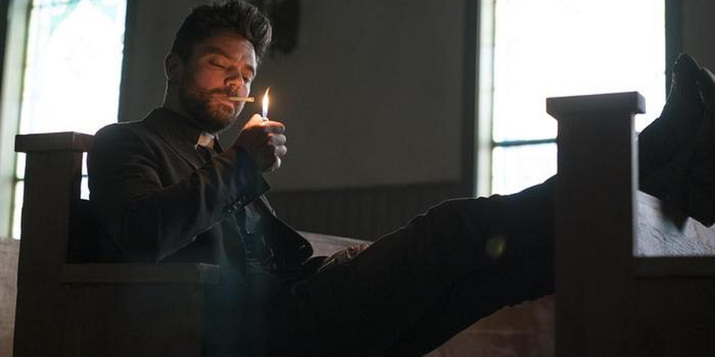
That's the tagline for the latest cinematic (and artistic) triumph from Guillermo del Toro. The Shape of Water makes every other commercial release this holiday season look like fecal matter. Everything from the impassioned performances to the cinematography, to the soundtrack, to the writing and character development were, in a word, perfection. As was the way the "connection beyond words" was portrayed.
Have you ever experienced it? A connection so intense, you don't even have to be in the same room--perhaps not even on the same planet--to feel the soul on the other end. To be linked so deeply, there is absolutely nothing that can or will deter it. Not time. Not distance. Not difference. Nothing.
I've felt it. Or rather, feel it. And, perhaps because of that connection, del Toro's ability to capture real love made a real impact.
I grew up watching old black-and-white "monster" movies, where the true monsters were the humans, and the soul who appeared to be "different" had more humanity than any of our sad lot. The Shape of Water took those early film-explorations of the human condition and expanded it times one-thousand. I sat in the theatre, floored by how what is essentially a modern fairy-tale (set during the 20th century space-race between the States and Russia), gently coerced me to reflect on my life today, now perilously perched on the edge of 2018. When the film ended, as all the best things must in our physical existence, I realized something about myself that few movies have the ability to show their audience:
The truth.
Circumstances beyond our control happen. But how we think and feel--regardless of what's going on--is the one thing we can control. The exception is the human heart. We never control it. We love who we love, and when we truly love, it never ends. Most people just lie about that--"that" being the heartbreak that seems to fade but it's not actually gone. We just get better at burying it. Ego and pride are often to blame. More's the shame. Because ego and pride can't satisfy your heart or your soul, or, your body. Nor can either sever the invisible thread that connects two hearts. Although, sometimes that "thread" feels more like galvanized cable. Unyielding. Unbending. Unbreakable.
My grandmother had this saying she would try to translate into English from German, "ein Herz fuhlt ein Herz," or, "a heart feels a heart." It sounds similar in Yiddish. The biggest difference is that Yiddish is spelled with Hebrew letters and German isn't. My grandmother's words seemed to echo in the theatre as I experienced The Shape of Water in the same way I experienced the shape of love. A shape I miss. A shape that leaks out of my eyes and into my dreams when I'm no longer in control of my thoughts, or apparently, my feelings.
Love is the only thing worth shedding a tear over. There is no greater pain, outside of losing a child. When you give real love, you give a piece of yourself--a piece you can never get back. It's like walking around with a gaping hole in your chest. If you've never felt that, then you have never really been in love. You may feel love for many people. Deep care, respect, and general gratitude in finding another who can make you smile and laugh and dream. Those elements are part of being in love, too, but it also includes something more as well. Something beyond words. For, when you truly fall in love, there is no undoing it--try as we might.
What do you do when the monster you love disappears below the surface without you? We all can't be as "lucky" as Elisa Esposito, del Toro's protagonist. Elisa is portrayed in a stunning display of performance-art by British-born actress (of Irish descent), Sally Hawkins--who has been previously nominated for Academy, BAFTA and Oscar awards. Hawkins actually won the Golden Globe for Best Actress for her role in Happy-Go-Lucky (2008), written and directed by Mike Leigh. Her portrayal of Elisa Esposito has already earned Hawkins another Golden Globe nomination as Best Actress. As award-season unfolds, Hawkins will likely earn even more accolades.
In The Shape of Water, Hawkins plays a woman who can hear but cannot speak. She uses sign language throughout the film to communicate. I speak ASL, or American Sign Language, and taught college students at the National Technical Institute for the Deaf (NTID). One of the biggest complaints was the lack of representation of Deaf-culture in American pop culture. Television series like "Switched at Birth," and "America's Next Top Model," have made small strides in that area. And, while Elisa Esposito is not Deaf, having the star of a film of this caliber communicate primarily through sign language was a wonder to both see and experience, as was Octavia Spencer's supporting role.
Spencer's talent for conveying strong yet vulnerable characters with big personalities knows no bounds. Also nominated for a Golden Globe for her role as Zelda Fuller in The Shape of Water, this Academy Award, Golden Globe, SAG, and BAFTA-winning actress brings a sense of realness to women's lives. Every girl needs a friend like Octavia Spencer plays on screen.
Richard Jenkins, who many recognize from HBO's "Six Feet Under" (2001-2005), but who I loved in films like Burn After Reading (2008) and Let Me In (2010), plays Giles, a struggling artist from the LGBTQIA community, and Elisa's well-meaning next door neighbor. One of the tastier story highlights for his character creates art out of the difference between what we see, and what lies beneath.
We have all loved "monsters," or at least, I hope that's the case. I hope there are many more than not who see the beauty in a person others see as "ugly" or "scary" or "strange." What's on the surface is often deceiving. As is how we see ourselves. I once knew a man who saw an "obese ogre" when he looked in the mirror. But anyone else who looked at him easily saw a variation of Thor. That was the big difference in my experience with loving a monster--because my monster believed himself to be monstrous, he became monstrous. In all the other fairytales about loving monsters, it is the outside that creates unfounded fear; the inside is far more humane than any human can possibly muster.
I think this movie will have me shedding more than one tear over more than one day. Some mirrors can't be ignored. Because, what is reflected back at us is so surprisingly real, shocked, we simply can't look away.
I can't look away. Complacency is a coping strategy for survival. The problem with complacency is that we get used to feeling comfortable, safe--when, in truth, we are neither. And, for every day we spend pretending to be something we're not, we die a little more...on the inside. You may not even be aware of it. You may even think yourself happy. Until you find a mirror you can't ignore, like I did in The Shape of Water. Then, you will be forced to remember why you hide beneath the soft, warm blankets of what is familiar--still shivering, but not from being cold. Or, wet.
When you have a connection beyond words, there are no words to describe the feelings of loss, of betrayal, of grief, when the physical aspect disappears beneath the surface of murky social waters that are deep and dark and dangerous. Both Elisa and her "monster" had to literally die and be reborn again in order to be together. I think it's like that in real life, too. Though, I am sorry to think it. To feel it. And most especially, to know it.
"Unable to perceive the shape of you, I find you all around me. Your presence fills my eyes with your love. It humbles my heart. For, you are everywhere...."
Everywhere, yet nowhere. Beneath the perfect glass-like reflection of water, there is truth.
Truth does not hide...it is we who choose not to seek it.
#Surface









 RSS Feed
RSS Feed